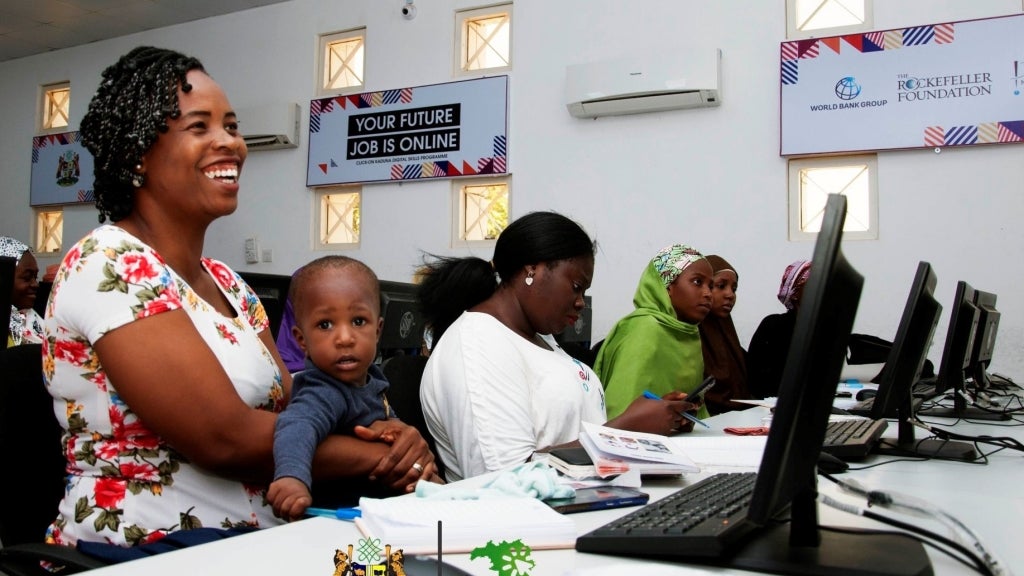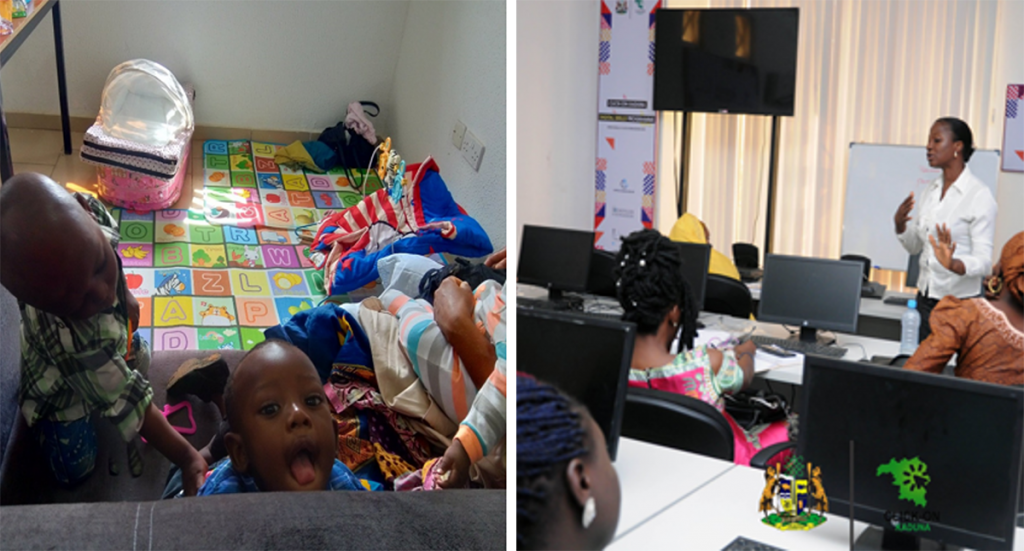
The coronavirus (COVID-19) pandemic is disproportionately impacting women’s livelihoods. Young women are more prone to unemployment and under-employment than men, and many work in service and informal sector jobs that have been most disrupted during the crisis.
As part of their COVID-19 response, governments are exploring digital solutions to promote economic recovery. However, gender gaps in internet use and mobile phone access mean that job opportunities in the digital economy remain out of reach for many women. This inequality is exacerbated in communities affected by fragility, conflict and violence (FCV), where women often face greater safety and security concerns, significant mobility constraints, and restrictive sociocultural norms. This is the case in Kaduna, a state in northern Nigeria affected by years of conflict and instability.
So how can we make sure that women in FCV settings aren’t left behind in the shift to digital? The success of the recent Click-On Kaduna program offers valuable insights.
Digital jobs for vulnerable young women in Northwest Nigeria
In early 2019, Hauwa A. was unemployed, and her lack of self-confidence kept her from starting a business. Meanwhile Nana M., a university graduate with a degree in health economics, had a passion for information technology – yet despite her best efforts, she couldn’t find full-time employment in the IT industry.
These frustrations are common for young women in Northwest Nigeria, where economic development is stagnant and digital infrastructure remains underdeveloped. Kaduna State has the second highest unemployment rate (26.8%) and the second highest under-employment rate (31.0%) in the Northwest zone.
The World Bank, with support from the Rockefeller Foundation, designed the Click-On Kaduna pilot to demonstrate how digital jobs can help young women in FCV contexts break barriers to employment. The program ran from April to December 2018 and provided digital skills training and entrepreneurship support to over 1,500 men and women aged 18 to 40 in Kaduna State. Over 40% were women; trainees submitted video applications as part of a competitive selection process. Together, participants have generated over $200,000 in income, including online work.

Strategies for helping women in FCV contexts enter the digital economy
The Click-On Kaduna team implemented four key gender-inclusive strategies to help its women participants succeed:
- Participation incentives: The team realized that women would need safe childcare options if they were to participate fully in the training. The Click-On Kaduna team offered free day care spaces for children, as well as free meals to participants. By providing childcare, meals, and other support, digital jobs programs can increase the likelihood of women’s participation and success.
- Safe spaces: Connecting women with role models can help build their confidence to navigate careers in the ICT sector and other male-dominated industries. Click-on Kaduna created women-only training cohorts led by female instructors to create safe spaces for developing women’s confidence and critical communication skills. The team also recruited successful women entrepreneurs from northern Nigeria as mentors and guest lecturers. These role models helped women build confidence to successfully pursue online work and launch their own businesses.
- Community buy-in: Social and cultural norms around appropriate types of work can restrict women’s participation in the digital economy. Click-On Kaduna launched media campaigns to raise awareness of the benefits of digital skills and entrepreneurship, especially for women. The team engaged with male community and religious leaders to encourage women’s participation. They also invited husbands to a “come to school day” so that they could better understand the training and work that the women were doing. This community support can reduce the risk of interpersonal violence, targeted attacks, or retaliation against women who might otherwise be seen as violating local cultural norms.
- Flexible curriculum: Ongoing unrest in the region led to mandatory curfews and increased travel restrictions. Anticipating such challenges, the Click-On Kaduna designed a flexible curriculum that allowed for both in-person and online training. This blended approach allowed women in particular to continue develop digital skills and perform online work while prioritizing their safety.

The Click-On Kaduna program has empowered women to access new jobs in the digital economy. Gone is Hauwa’s lack of confidence. She’ s now a certified digital marketer with her own content strategy business. Nana is currently an IT administrator for one of the biggest banks in Nigeria. And many female trainees are using their new digital skills to perform online freelancing work during the ongoing pandemic.
During this unprecedented global crisis, similar training programs can be implemented remotely. Safe training locations for women can be modified to meet health and safety protocols. Online training delivery can expand to include mentorship, and digital platforms can build virtual support communities for women. Governments can ensure that digital skills and entrepreneurship initiatives in FCV contexts are safe and inclusive and that women can thrive in the digital age. Just ask Hauwa and Nana.




Join the Conversation